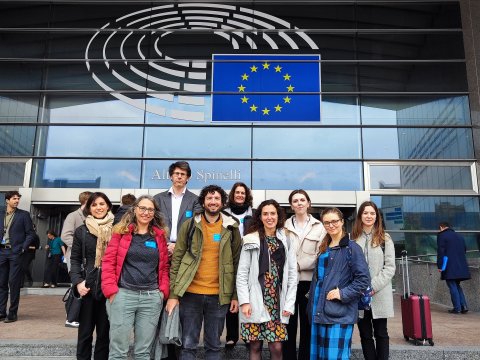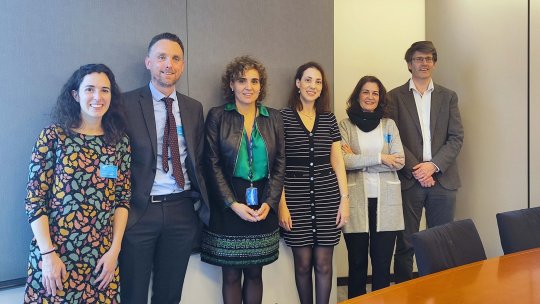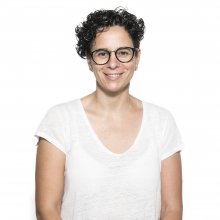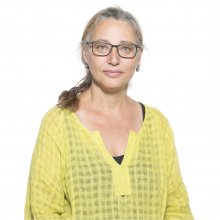Images
- The event aimed to address the known policy and service delivery constraints that prevent greater access of cancer patients in Europe to personalised medicine.
- CGI-Clinics seeks to implement and systemise the interpretation of tumour sequencing in clinical decision-making.
- This is a project with €10M of funding over five years and involving 17 associated entities.
Yesterday, representatives of IRB Barcelona and the CGI-Clinics project held a one-hour event at the European Parliament to discuss the use of personalised medicine for cancer treatment. Attended by medical professionals, patients' associations, political leaders, and the general public, the gathering sought to address known policy and service delivery barriers preventing greater access of European cancer patients to personalised medicine.
Personalised medicine is a key component of the EU Beating cancer Plan, which proposes to introduce several flagship initiatives to promote personalised medicine in cancer treatment.
The CGI-Clinics project, led by Dr. Núria López-Bigas at IRB Barcelona aims to build a new Cancer Genome Interpreter (CGI), a bioinformatics tool that will systemise tumour genome interpretation for clinical decision-making. This tool will enable medical professionals to choose the most effective cancer treatments for each patient, thereby increasing the access of these individuals to personalised medicine.
“CGI-Clinics aspires to push forward the community-driven European automated tool for cancer genome interpretation. The project will channel efforts into equity (versatile and adapted to all hospitals of all sizes), innovation (it solves mutations of unknown significance and can process large datasets), and patient data sharing as a central pillar for the benefit of future patients and society,” explained Dr. Olivia Tort, CGI-Clinics project manager at IRB Barcelona.

Chaired by the MEPs Dolors Montserrat (EPP, Spain) and Tomislav Sokol (EPP, Croatia), the event began with an overview of the CGI-Clinics project and its relevance in policy making. After the presentation, a round table was held in which medical oncologists, patients' associations and European policymakers discussed the future of personalised oncology in the EU.
In his introduction to the event, Tomislav Sokol MEP, who is also responsible for the European Health Data Space (EHDS), recognized the importance of sharing clinical data and facilitating patient access to personalized cancer medicine.
“Cancer is a primary mission of Horizon Europe. The EU parliament and the European Health Data Space can really make a difference in research and innovation to boost personalised medicine to improve patients' treatments,” he stated.
MEP Dolors Montserrat, a member of the European Parliament's Special Committee on Beating Cancer (BECA), wrapped up the event with a reflection on the future of personalised oncology and the Parliament's commitment to patients, research centres, and healthcare professionals across Europe.
“This is an ideal moment for initiatives like this, which are committed to the most advanced clinical innovations focused on the patient. Today, health is a priority in the EU and, for the first time, we have a permanent committee on health in the Parliament. It is a great opportunity for political decision-making to forge the way to the sustainability of projects like the CGI-Clinics,” she stressed.
Dr. Adela Maghear, Senior EU Affairs Manager at the European Cancer Patient Coalition (ECPC), one of the partners in the CGI-Clinics project, commented that “Europe is living a digital momentum now with the recent publication by the European Commission of the EHDS regulation. And one of the main objectives of this regulation is to support the use of health data for better healthcare delivery, better research, innovation and policy making. CGI-Clinics will contribute to achieving these objectives while putting patients at the heart of the digital momentum”.
The event was well-attended, both in-person and virtually, by people across Europe and beyond. It provided a valuable occasion for stakeholders to come together to discuss the challenges and opportunities of personalised medicine in Europe.
More information on the CGI-Clinics: https://www.cgiclinics.eu/
About IRB Barcelona
The Institute for Research in Biomedicine (IRB Barcelona) pursues a society free of disease. To this end, it conducts multidisciplinary research of excellence to cure cancer and other diseases linked to ageing. It establishes technology transfer agreements with the pharmaceutical industry and major hospitals to bring research results closer to society, and organises a range of science outreach activities to engage the public in an open dialogue. IRB Barcelona is an international centre that hosts 400 researchers and more than 30 nationalities. Recognised as a Severo Ochoa Centre of Excellence since 2011, IRB Barcelona is a CERCA centre and member of the Barcelona Institute of Science and Technology (BIST).






